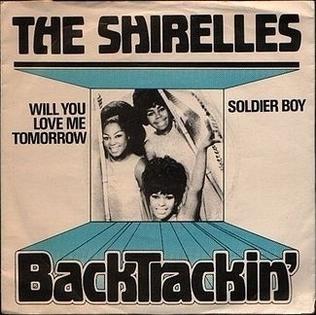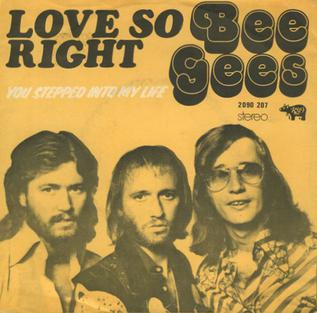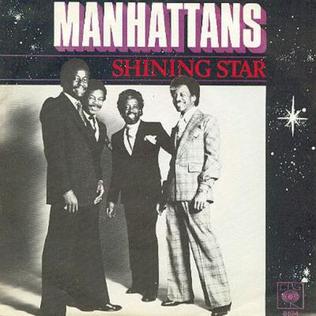
The Manhattans are an American popular R&B vocal group. Their songs "Kiss and Say Goodbye", recorded in 1976, and 1980's "Shining Star", both sold millions of copies. The Manhattans have recorded 45 hits on the Billboard R&B Chart, including twelve top-10 R&B hits in the United States, starting in 1965. Sixteen of their songs have reached the Billboard Hot 100, including two top 10s and a number-one hit with their song "Kiss and Say Goodbye". They also charted eight U.S. R&B top 20 Albums, three of which were RIAA certified gold.

"My Girl" is a soul music song recorded by the Temptations for the Gordy (Motown) record label. Written and produced by the Miracles members Smokey Robinson and Ronald White, it became the Temptations' first U.S. number 1 single, and is currently their signature song. Robinson's inspiration for writing "My Girl" was his wife, Miracles member Claudette Rogers Robinson. The song was included on the Temptations 1965 album The Temptations Sing Smokey. In 2017, the song was selected for preservation in the National Recording Registry by the Library of Congress as being "culturally, historically, or artistically significant".

"Never Can Say Goodbye" is a song written by Clifton Davis and originally recorded by the Jackson 5. The song was originally written and intended for the Supremes; however, Motown decided it would be better for the Jackson 5. It was the first single released from the group's 1971 album Maybe Tomorrow, and was one of the group's most successful records. It has been covered numerous times, most notably in 1974 by Gloria Gaynor and in 1987 by British pop group The Communards.

"I Just Called to Say I Love You" is a ballad written, produced, and performed by American R&B singer and songwriter Stevie Wonder. It was a major international hit, and remains Wonder's best-selling single to date, having topped a record 19 charts.

"Turn the Beat Around" is a disco song written by Gerald Jackson and Peter Jackson, and performed by American actress and singer Vicki Sue Robinson in 1976, originally appearing on her debut album, Never Gonna Let You Go (1976). Released as a single, the song went to #10 on the Billboard pop charts, and #73 on the Billboard soul chart. The song earned Robinson a Grammy nomination for Best Female Pop Vocal Performance. The track also went to number one on the Billboard disco chart for four weeks. "Turn the Beat Around" is considered a disco classic and is featured on many compilation albums.

"Misty Blue" is a song written by Bob Montgomery that has been recorded and made commercially successful by several music artists. Although Montgomery wrote the song for a different artist in mind, it was brought first to the attention of Wilma Burgess in 1966. It was recorded by Eddy Arnold the following year, both versions were top 5 Country Hits. A decade later, blues artist Dorothy Moore released the highest-charting version of the song and it reached the top ten in several different radio formats. Following Moore's revival of the track, numerous artists re-covered the tune, including country artist Billie Jo Spears. Spears's version would also go on to become a successful single release. Numerous other artists and musicians of different genres have recorded their own versions of "Misty Blue". The song is now considered both a country music and blues standard.

"Will You Love Me Tomorrow", sometimes known as "Will You Still Love Me Tomorrow", is a song with words by Gerry Goffin and music composed by Carole King. It was recorded in 1960 by the Shirelles at Bell Sound Studios in New York City, and hit number one on the Billboard Hot 100 chart. The song was the first by an African-American all-girl group to reach number one in the United States. It has since been recorded by many other artists including a 1971 version by co-writer Carole King.

"You Send Me" is a song written and originally recorded by American singer Sam Cooke, released as a single in 1957 by Keen Records. Produced by Bumps Blackwell and arranged and conducted by René Hall. The song, Cooke's debut single, was a massive commercial success, becoming a No. 1 hit on both Billboard's Rhythm & Blues Records chart and the Billboard Hot 100.

"Chain Gang" is a song by the American singer-songwriter Sam Cooke, released on July 26, 1960.

"Don't Pull Your Love" is a song written by Brian Potter and Dennis Lambert which became a top ten hit single in 1971 for Hamilton, Joe Frank & Reynolds.

"He Will Break Your Heart", is a song originally performed and co-written by Jerry Butler, a top-ten hit in 1960.

"Love So Right" is an R&B ballad recorded by the Bee Gees. It was the second single released on the album Children of the World.

Gerald Alston is an American soul/R&B singer, and the lead singer of the Grammy Award winning group The Manhattans between late 1970 and 1988, recording 25 top 40 R&B and 12 Hot 100 Pop Singles. Alston was lead singer on their most successful 1976 Platinum song "Kiss and Say Goodbye", which topped all U.S. pop and R&B charts and was number one in four countries. Alston left the group in 1988 to pursue a solo career and recorded five albums and ten singles, including the hit singles "Take Me Where You Want To", "Slow Motion" and "Getting Back into Love", he also recorded a remake of Atlantic Starr's "Send for Me", most of which was for Motown Records.

"Always and Forever" is an R&B song written by Rod Temperton and produced by Barry Blue. It was first recorded by the British-based multinational funk-disco band Heatwave in 1976. Released as a single on December 3, 1977, the song is included on Heatwave's debut album Too Hot to Handle (1976) and has been covered by numerous artists, becoming something of a standard.

"Kiss Me Goodbye" is a Les Reed/ Barry Mason composition recorded in 1968 by Petula Clark.

"Love Is Alive" is a song by Gary Wright taken from the 1975 album The Dream Weaver. It features Wright on vocals and keyboards and Andy Newmark on drums, with all music except for the drums produced on the keyboards. The album's title cut and "Love Is Alive" both peaked at No. 2 on the Billboard Hot 100 singles chart. "Love Is Alive" spent 27 weeks on the chart, seven weeks longer than "Dream Weaver". Billboard ranked "Love Is Alive" as the No. 9 song of 1976.

"Shining Star" is a popular song written by the American songwriters and music producers Leo Graham and Paul Richmond. The song was recorded in 1980 by popular American R&B vocal group The Manhattans and released the same year on the album After Midnight. "Shining Star" was released as a single in 1980 and peaked at number 4 on the US Billboard R&B chart, and number 5 on the U.S. Billboard Hot 100. The song was most successful in New Zealand, where it reached position number 2; the same position that it also reached in the Black Oriented Singles of the Record World magazine in the USA. Although it did not reach the number-one on any chart, "Shining Star" was The Manhattans's highest-charting hit since the worldwide hit "Kiss and Say Goodbye" released in 1976.

"How Many Times Can We Say Goodbye" is a 1983 song by Dionne Warwick and Luther Vandross. The ballad was issued as the lead single of Warwick's album of the same name, later appearing on Vandross' album Busy Body, both of which were released in 1983.
"Forever by Your Side" is a romantic song written and produced by the American songwriters and music producers Marc Blatte and Larry Gottlieb. The song was recorded in 1983 by popular American R&B vocal group The Manhattans and released the same year on the album Forever by Your Side. The title track "Forever by Your Side" was released as a single in September 1983, and had moderate success in the US, peaking at number 30 on the R&B chart, but did not reach any position on the Billboard Hot 100.
"Crazy" is a song written and produced by the Americans songwriters and music producers John V. Anderson, Steve Williams and Steve Horton. The song was recorded in 1983 by popular American R&B vocal group The Manhattans and released the same year on the album Forever by Your Side by Columbia Records. "Crazy" was released as a single in June 1983, reaching No. 4 on the R&B chart, and No. 72 on the Billboard Hot 100. Besides the United States, "Crazy" peaked at No. 63 on the UK Singles chart. Two formats were released for the single of "Crazy". The first was 7" single, where "Crazy" was only 3:55 in length and containing the song "Love Is Gonna Find You" on B-side. The second was 12" single, containing the instrumental version of "Crazy" on B-side.


















